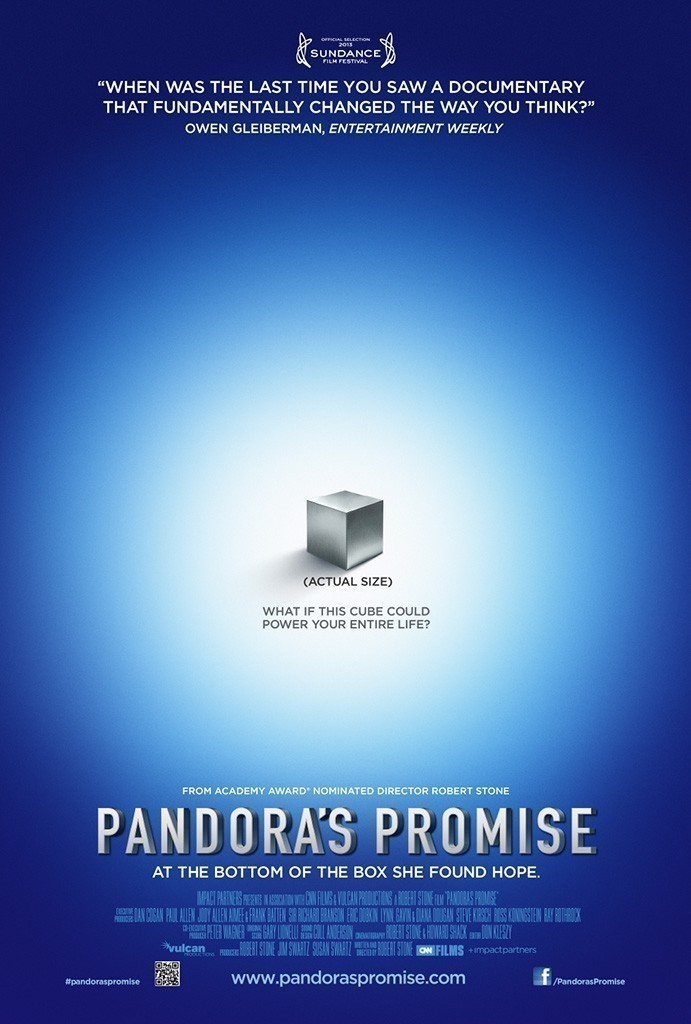 Pandora’s Promise
Pandora’s Promise
Director Robert Stone
2013, 87 minutes
It doesn’t happen very often that longtime supporters of a scientific theory or social cause reconsider their stance and do a public one-eighty. Yet, this is exactly what the well-known and respected environmentalists in Pandora’s Promise have done. Whole Earth Catalog publisher Stewart Brand, Pulitzer Prize-winning A-bomb historian Richard Rhodes, New Yorker journalist Gwyneth Cravens, English eco-activist Mark Lynas, and environmental policy expert Michael Shellenberger all revised their firm opposition to nuclear power. They now argue that nuclear power might actually be safer, cleaner, and greener, than other energy sources.
The though-provoking documentary Pandora’s Promise is built around the narrative of these converts and makes the case for the use of nuclear energy as a better option than coal or oil.
The film starts off with a discussion of the alternatives to the unsustainable use of fossil fuels and concludes that solar and wind power are undependable and the technology neither financially feasible nor capable of delivering enough power for an increasingly energy hungry world. In addition, according to the film, wind turbines require natural gas as back up, solar panels are toxic to produce, and natural gas has unfortunate environmental consequences—for example the leakage of methane, a far more potent global warming gas than CO2. In an attempt to win viewers over, the film makes one particularly intriguing assertion: nuclear power is not as deadly as many opponents assume. In fact, it claims that nuclear power is second only to wind turbines in terms of safety. Apparently many more people are killed by burning coal or manufacturing solar panels.
The film insists that public perception of safety of nuclear power bears little relation to reality. Many misconceptions are perpetuated by people like physician and anti-nuclear activist Helen Caldicott, who is shown lecturing a crowd about the million people who died as a result of the 1986 Chernobyl disaster. She is followed by the articulate and soft spoken Richard Rhodes who carefully reminds the viewer that Caldicott’s claims aren’t based on scientific evidence. Citing The Chernobyl Forum, a United Nations’ report, he notes that the damage caused to people by the fallout was remarkably limited. In total, 56 people died as a result of Chernobyl and an estimated 4000 people have shorter life expectancies, according to this report.
Pandora’s Promise also debunks a number of other myths about nuclear power, from the dangers of low levels of tritium in drinking water, to the correlation between congenital malformations and radiation.
Overall filmmaker Robert Stone, makes an compelling argument for the use of nuclear power, and even though Pandora’s Promise will not convince everyone, it is a welcome and above all refreshing contribution to the nuclear energy debate.
Elke Weesjes Sabella is former editor of the Natural Hazards Observer. She joined the staff in December 2014 after a brief stint as a correspondent for a United Nations nonprofit. Under her leadership, the Observer was revamped to a more visual format and one that included national and international perspectives on threats facing the world. Weesjes was the editor of the peer-reviewed bimonthly publication United Academics Journal of Social Sciences from 2010 to 2013.
Weesjes Sabella also worked as a research associate for the Center for Disaster and Risk Analysis, formerly located at Colorado State University (although no longer active). In that role, she collected and analyzed data and translated research findings for a broader audience. She played a central role in finalizing the Disaster Preparedness among Childcare Providers in Colorado project, which examines all-hazards preparedness in daycares and in-home childcare across Colorado. She co-authored the report based on the first stage of the project, which was funded by Region VIII of the Federal Emergency Management Agency.
Weesjes Sabella specializes in cultural memory and neighborhood/community change in times of acute and chronic stress. She has published articles on the impact of drought on farming communities in Kansas, the effects of Superstorm Sandy in Far Rockaway, Queens, urban renewal in the Bedford-Stuyvesant neighborhood in Brooklyn, and health services for vulnerable populations in the South Bronx.
Weesjes Sabella received her PhD from the University of Sussex. Her dissertation, Children of the Red Flag: Growing up in a Communist Family During the Cold War (2012), as well as the majority of her publication record, share the common methodology of understanding culture and identity through oral history.